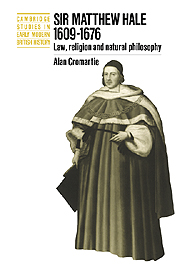Book contents
- Frontmatter
- Contents
- Acknowledgements
- Introduction: a summary life
- Part I Law
- 1 Coke: the appeal to reason
- 2 Selden: the appeal to contract
- 3 The rights of the Crown
- 4 Interregnum
- 5 Protectorate
- 6 Restoration: ‘the nature of laws’
- 7 Restoration: constitutional theory
- 8 Restoration: legal practice
- Part II Religion
- Part III Natural philosophy
- Conclusion
- Appendix: Hale and witchcraft
- Bibliography
- Index
- Titles in the series
8 - Restoration: legal practice
Published online by Cambridge University Press: 05 May 2010
- Frontmatter
- Contents
- Acknowledgements
- Introduction: a summary life
- Part I Law
- 1 Coke: the appeal to reason
- 2 Selden: the appeal to contract
- 3 The rights of the Crown
- 4 Interregnum
- 5 Protectorate
- 6 Restoration: ‘the nature of laws’
- 7 Restoration: constitutional theory
- 8 Restoration: legal practice
- Part II Religion
- Part III Natural philosophy
- Conclusion
- Appendix: Hale and witchcraft
- Bibliography
- Index
- Titles in the series
Summary
A proper assessment of Hale as a judge would involve assessment of his whole profession, at a puzzling transitional moment in the history of the law. The law of 1642 was easily restored, but the culture of the lawyers had undergone a change. The formal part of legal education, the ‘readings’ and the exercises of the Inns of court, was killed by the disruption of the previous eighteen years. This ritualistic process (whose details are of no importance here) was less and less connected with the student's actual needs, but it must have had some formative effects. Two features seem especially important: the assumption it made that all learning was basically oral; and the way it involved the profession (through taking part in exercises at each Inn of court) in training up replacements for its ranks. A ‘reading’ at his Inn (a kind of lecture series on a statute) was traditionally the climax of an advocate's career, a symbol of the intimate connection between practising and passing on the law.
Hale recognised a duty to teach the law he knew. North used to see him, when he was Chief Justice,
managing matters of law to all imaginable advantage to the students, and in that he took pleasure or rather pride. He encouraged arguing when it was to the purpose, and used to debate with the counsel; so that the court might have been taken for an academy of sciences, as well as the seat of justice.
- Type
- Chapter
- Information
- Sir Matthew Hale, 1609–1676Law, Religion and Natural Philosophy, pp. 118 - 136Publisher: Cambridge University PressPrint publication year: 1995



